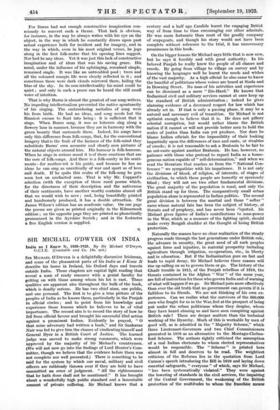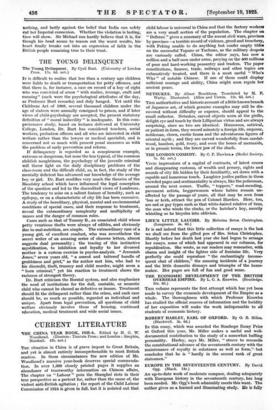SIR MICHAEL O'DWYER ON INDIA
India as I Knew It, 1885-1925. By Sir Michael O'Dwyer, G.C.I.E. (Constable and Co. 18s. net.)
Sm MICHAEL O'DWYER is a delightfully discursive Irishman, and some of the pleasantest parts of his India as I Knew it describe his home in Ireland, his Oxford days and travels outside India. Those chapters are capital light reading that reveal a man of ready resource with a genial faculty for getting on with those among whom his lot is cast. These qualities are apparent also throughout the bulk of the book, which is deadly serious. He has two chief aims, one public, and one personal. The first is to give a true picture of the peoples of India as he knows them, particularly in the Punjab in official circles ; and to point from his knowledge and experience those lessons which he believes to be . of vital importance. The second aim is to record the story of how he fell from official favour and brought his successful libel action against a prominent Indian. Evidently he prayed, " 0 that mine adversary had written a book," and Sir Sankaran Nair was led to give him the chance of vindicating himself and General Dyer in a British Court. of Justice. The learned judge was moved to make strong comments, which were approved by the majority of Sir Michael's countrymen. (We will not now go into the findings of Lord Hunter's Com- mittee, though we believe that the evidence before them was not complete nor well presented.) There is something to be said for the system by which our naval, military and civil officers are ruthlessly thrown over if they are held to have committed an error of judgment. " All the righteousness that he bath done shall not be mentioned." It has brought about a wonderfully high public standard and a lamentable amount of private suffering. Sir Michael knows that a century and a half ago Candide learnt the engaging Britisk way of from time to time encouraging our other admirals. He was more fortunate than most of the goodly company of scapegoats, and though his story would not have been complete without reference to the trial, it has unnecessary prominence in this book.
On the bigger lessons Sir Michael says little that is now new, but he says it forcibly and with great authority. In his beloved Punjab he really knew the people of all classes and creeds. By going from village to village on survey and by knowing the languages well he learnt the needs and wishes of the vast majority. As a high official he also came to know the handful of politicians whose voices are heard at Simla and in Downing Street. No man of his activities and experience can be dismissed as a mere " Die-Hard." He knows that Indianized civil and military services cannot at once keep up the standard of British administration ; indeed he gives alarming evidence of a decreased respect for law which has already set in. If that is only a passing phase, it may be a natural and necessary evil of transition. Sir Michael is not optimist enough to believe that it is. He does not pillory oriental corruption, but would rather blame the British nation if it cannot or will not provide better men to hold the scales of justice than India can yet produce. Nor does he blame Indian officials for the impossiblity of their looking impartially upon the differences of race and caste, or rivalries of creeds; it is not reasonable to ask a Brahmin to be fair to an out-caste against another Brahmin. He has, however, no patience with those who pretend to regard India as a homo- geneous nation capable of " self-determination," and when we read the literature that reaches us from the " National Con- ference " we sympathize with his impatience. It is not only the divisions of blood, of religion, of interests, of stages of civilization, to which these people are honestly or speciously blind ; they will not see two. other fundamental divisions. The great majority of the population is rural, and only the British stand up for them. The comparatively small urban population alone is represented in Indian politics. The second great division is between the martial and those " softer " races whose natural fate has been the subject of history, of threats and of prophecy, and has never been Disputed. Sir Michael gives figures of India's contributions to man-power in the War, which as. a measure of the fighting spirit, should make every Bengali shudder at the thought of losing British protection.
Naturally the masses have no clear realization of the steady progress made through the last generations under British rule, the advance in security, the great need of all such peoples against force and injustice, in material prosperity including agriculture through irrigation, co-operation, etc., in liberty and in education. But if the Indianization goes on fast and leads to rapid decay, Sir Michael believes these masses will rise up calling on us to govern them or go. The history of the Ghadr trouble in 1915, of the Punjab rebellion of 1919, the threats contained in the Afghan " War " of the same year, are full of instruction for those who govern India and of warning of what will happen if we go. Sir Michael puts more effectively than ever the old truth that no government can govern if it is faithless to its Mends. We are not thinking of his own ex- periences. Can we realize what the survivors of the 680,000 men who fought for us in the War, feel at the prospect of being put under the urban politicians whom they despise, whom they have heard abusing us and have seen conspiring against British rule? These are deeper matters than the technical working of the Dyarchy. Much of this is workable by men of good will, as is admitted in the " Majority Scheme," which three Lieutenant-Governors and two Chief Commissioners presented in 1919 as an alternative to the Montagu-Chehns- ford Scheme. The authors rightly criticized the assumption of a real Indian electorate to whom elected representatives would be responsible. The " Scheme " is printed here almost in full and deserves to be read. The weightiest criticism of the Reforms lies in the quotation from Lord Curzon's speech introducing the Bill in 1919 and laying down essential safeguards, " everyone " of which, says Sir Michael, " has been systematically violated." They were against the lowering of standards in the civil services, the impairing of the Central Government, the weakening of the British protection of the multitudes to whom the franchise means nothing, and lastly against the belief that India can safely cut her Imperial connexion. Whether the violation is lasting, time will show. Sir Michael can hardly believe that it is, for though his head seems to reason out the worst results, his heart finally breaks out into an expression of faith in the British people remaining true to their trust.











































 Previous page
Previous page